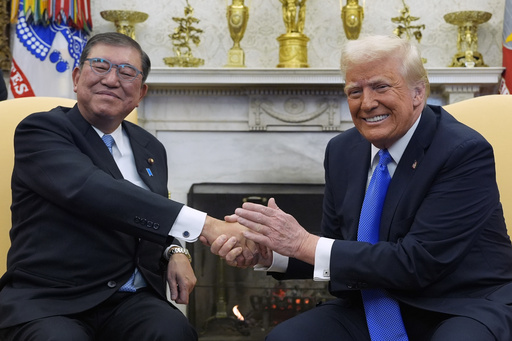
Japanese Prime Minister Shigeru Ishiba visited the White House on Friday around noon. He was set to engage in a working lunch with President Trump, followed by a joint news conference, which was anticipated to last just over two hours before he returned to Tokyo.
At the same time, many staffers from the U.S. Agency for International Development (USAID) began being put on forced leave. Legal actions are being pursued by employee associations, challenging the swift disassembly of this long-standing agency and its global programs under the new Trump administration.
Recently, Trump announced his plans to unveil reciprocal tariffs on countries engaging in similar trade practices. During the meeting with Ishiba, he stated, “I’ll be announcing that next week, reciprocal trade, so that we’re treated evenly with other countries.” His focus during the campaign had been to align tariffs imposed on American exports with those levied by other nations. However, he did not disclose which countries might face these tariffs. The president also expressed a desire to collaborate with Japan to address the approximately $68 billion U.S. trade deficit.
The directive from Sean Duffy could also prohibit entities receiving transportation funds from enforcing vaccine or mask mandates, while tethering transportation funding to immigration enforcement initiatives. This proposal could significantly impact transportation projects in Republican-majority states that often display higher birth rates, which correlate with declining educational attainment.
Senator Marsha Blackburn posed a question regarding the potential linkage of transportation funding to population growth, noting, “People are leaving some of these blue states and coming to places like Tennessee,” indicating a need to assess federal highway funding allocations.
In a shared memo from Duffy, there was a push for prioritizing families by favoring funding for regions with above-average marriage and birth rates. This directive received a chilling response from Washington’s Democratic Senator Patty Murray, who denounced it as “disturbingly dystopian.” Critics like Kevin DeGood, a housing policy expert, concerned about the implications for underpopulated regions, expressed skepticism around linking transportation investments to demographic statistics.
In legal developments, the Justice Department opted not to publicly identify FBI agents involved in the investigations surrounding the Capitol riot on January 6, 2021. The agents’ legal representatives argued that revealing identities could jeopardize their safety. The department has committed in court filings to maintain confidentiality until further notice.
Democratic lawmakers have targeted the Treasury Department, seeking an inquiry into the access Elon Musk’s team allegedly had to federal payment systems, expressing worries about potential ramifications for the economy and national security. They point to threats against American privacy and compliance with tax laws as significant issues surrounding Musk’s entities.
A federal judge convened on Friday regarding a lawsuit against USAID, as staff and labor organizations requested the court to intervene in what they see as detrimental actions to the agency’s operations and staffing. Outside the agency’s headquarters, maintenance crews were noted to be obscuring signage with duct tape.
The Trump administration has also initiated an order requiring federal agencies to compile lists of employees who have received less than satisfactory performance ratings over the past three years. This is seen as a move aimed at streamlining federal workforce management, particularly against the backdrop of ongoing court battles concerning resignation offers.
In foreign relations, Trump has implied he may meet with both Ukrainian President Volodyr Zelenskyy and Russian President Vladimir Putin in the upcoming week, suggesting a desire to facilitate the cessation of hostilities in the region.
Additionally, Hungarian Prime Minister Viktor Orbán praised the dismantling of U.S.-backed NGOs and media entities within his country, positioning it as a move to eliminate what he views as foreign interference and influence.
In terms of executive initiatives, Trump referred to his proposed alterations for Gaza as a “real estate transaction,” suggesting potential redevelopment and resettlement of its residents, despite facing widespread criticism for the implications of such plans.
On the economic front, the Senate Budget Committee announced initiatives focused on bolstering military and border security budgets, with proposals exceeding $340 billion over four years. Concurrently, the job market indicators suggested that the current administration inherited a labor landscape that is underlaid with various challenges, posing potential obstacles to employment growth amidst fears of escalated inflation from ongoing tariff discussions.
With the ongoing evolution of policies and political maneuvers surrounding the administration, various sectors are closely monitoring how these initiatives impact both local and international landscapes.

